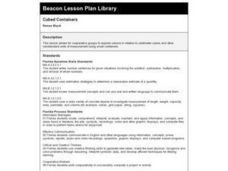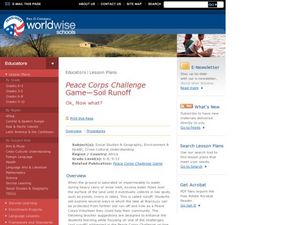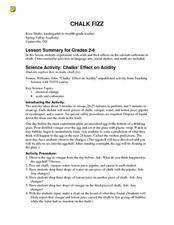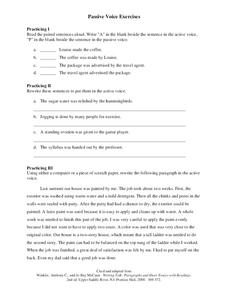Curated OER
Scientific Method, Control and Variables
Middle school scientists bathe in Bikini Bottom with SpongeBob and friends. They define steps in the scientific method. They identify independent variables, dependent variables, and the control for science experiments being carried out...
Cornell University
Predicting Chemical Reactions
Prove the Law of Conservation of Mass through a lab investigation. A well-designed instructional activity asks groups to combine materials and monitor indicators for chemical reactions. Measuring the mass of the reactants and products...
Curated OER
Physical Science: Festival of Bubbles
Investigate bubbles through the use of scientific inquiry. Pupils blow bubbles using several methods and measure the resulting bubble print. Measurements are recorded on a data table and transferred to a bar graph. Results are discussed...
Cornell University
Chemical Reactions
Investigate the Law of Conservation of Mass through a lab exploration. Individuals combine materials to initiate chemical reactions. They monitor for signs of reactions and measure the masses before and after the reactions for comparison.
Curated OER
Earth Day Unit Plan: Pollution in the Anacostia River - Biology Teaching Thesis
Sixth graders are able to explain that there are pollutants in the Anacostia River, what these pollutants can cause, and how to prevent further pollution. They examine the impacts that the pollutants of the Anacostia River could have on...
Curated OER
Bacteria Lab II: Effect of Bacteriocides
Written to follow "Bacteria Lab I: Preparing Agar Plates and Culturing Bacteria," also found via the Lesson Planet site, this lab sheet instructs your microbiologists to test a bacteriocide for effectiveness. In the preceding lab, they...
Curated OER
Observation Milk Fat Lesson
Turn your class loose to experiment with the different fat content in skim milk, whole milk, half and half, and heavy cream. This is a visually vibrant experiment, as learners drip food coloring on the surface of the products and measure...
Curated OER
Pollution or Prevention?
Students examine potential contamination on the environment due to products and by-products of a new industrial process. Students conduct a lab that explores the economic differences between choices of pollution cleanup and prevention.
Polar Trec
Is There Salt in a Glacier?
What can conductivity tell us about a glacier? Groups analyze glacial melt to determine salt content through an analysis of the pH and conductivity measurements of two samples. Groups then determine the source of the salts.
Curated OER
Clay Heads
Sculpting can be a rewarding way to accent a lesson plan in any subject. This project requires learners to design and sculpt a head out of clay. The entire process is outlined in this resource; including photos and suggested materials....
Curated OER
Revised: Adventures in Earth Day: Why Do We Care About Our Environment? - Biology Teaching Thesis
To describe the ecological and aesthetic importance of the Potomac River, Middle schoolers name the ways in which the river's values are jeopardized and explain the purpose of Earth Day. They write a response to a newspaper article in a...
Pingry School
The Gelation of Guar Gum with Borax
Some of kids' favorite toys are the products of science experiments. Scholars follow precise measurements to mix and create their own slime and Play-Doh. They observe the changing textures and the chemical reactions throughout the...
Exploratorium
Geyser
Although it requires a little extra preparation the first time you use this geyser demonstration, it can be used repeatedly once it has been constructed. This demonstration is useful in showcasing how heat leads to increased pressure and...
Cornell University
Atomic Bonding
Explore the connection of surface area to bonding within atoms. Learners complete lab investigations to model changing surface area with different sizes and concentrations of atoms. A flour fireball demonstration follows the labs to...
Curated OER
Cubed Containers
Learners explore volume in relation to centimeter cubes and other nonstandard units of measurement using small containers. They will use hands-on materials to practice this concept. You will need small objects and containers to set this up.
Curated OER
What Is Clay?
This resource could come in handy the next time you feel like teaching about clay. Basic sculpting techniques, vocabulary, and history of clay are outlined in this informative resource. Use prior to teaching an art project involving...
Curated OER
Peace Corps Challenge Game: Soil Runoff
Young scholars examine the causes and effects of soil runoff. In this environment lesson, students look at ways in which soil runoff is controlled. Young scholars then play a game and discuss how the Peace Corps deals with soil runoff...
K-5 Math Teaching Resources
Subtracting Mixed Numbers (Unlike Denominators)
Young mathematicians demonstrate their ability to subtract mixed numbers by completing this collection of fraction word problems. From figuring out the weight of objects in a package, to finding the difference in height between two...
It's About Time
The Nitrogen and Phosphorous Cycles
How do we affect the ecosystem, and what can we do to preserve it? Pupils explore chemicals that promote and inhibit plant growth, then discuss the importance of nitrogen and phosphorus to the survival of organisms and describe how...
Curated OER
Color the Snow
Are your teaching in a cold and snowy environment? If so, then try out this fun activity with your class. You mix a variety of colors in large jars to show learners the difference between primary and secondary colors, then let them mix...
Curated OER
Chalk Fizz
Little chemists observe the effects of acid on calcium carbonate as an example of chemical change. As a demonstration you will place a raw egg in vinegar overnight, and as a lab activity, learners drip vinegar onto a piece of chalk....
Curated OER
Recycling and Composting
Students set up composting sites that allow food scraps and paper to be recycled by nature. They are introduced to one aspect of recycling; composting. Students see how God recycles as the worms change garbage into something that brings...
Curated OER
Passive Voice Exercises
Strengthen understanding of grammar and syntax with this task. First, grammarians identify the active and passive voices, then they rewrite individual sentences to be in the active voice before manipulating an entire paragraph. Great...
Curated OER
Passive Voice Exercises
What is the difference between the active voice and the passive voice? Focus on the latter with your middle schoolers to help them strengthen their writing. First, they identify which sentences are written in the passive. Then, they...
Other popular searches
- Cleaning Water
- Cleaning Dirty Water
- Cleaning Water Experiments
- Sludge Cleaning Water
- Ways Cleaning Dirty Water
- Cleaning an Oil Spill in Water

























